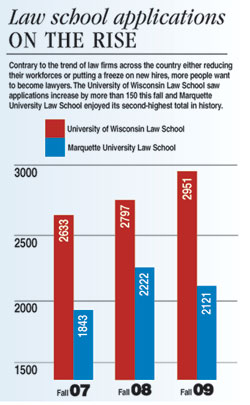 The recent death of Senator Edward Kennedy has led me to ponder what it means to share a common law school alma mater with someone that you don’t otherwise know. I find that I usually feel an instant sense of kinship to people when I find that they went to the same law school as I.
The recent death of Senator Edward Kennedy has led me to ponder what it means to share a common law school alma mater with someone that you don’t otherwise know. I find that I usually feel an instant sense of kinship to people when I find that they went to the same law school as I.
Both Senator Kennedy and I are graduates of the University of Virginia Law School, albeit 18 years apart. He finished in 1959, and I graduated in 1977. He was also my senator from 1978 to 1987, when I lived in Massachusetts.
However, I never had the opportunity to meet him in person. I almost did last spring when I was on the program at the UVA Law School reunion ceremonies. The event included the 50th reunion of the Class of 1959, but Senator Kennedy was unable to attend because of his deteriorating health.
While I would like to claim that a common law school provides a meaningful bond across time, I am not sure that it does. First of all, I’m not sure that the legal educations that Senator Kennedy and I received had much in common.
The decade of the 1960’s, which separated our law school experiences, represented a sea change in most areas of American law. The Virginia law faculty of the 1950’s was a bastion of conservative thinking. By the mid-1970’s, the faculty was squarely within the liberal mainstream of legal academia.
We probably had at most one or two of the same professors and one of those was the director of the law library who taught us both Legal Bibliography. (In addition, one of my professors, Dick Howard, was a law school classmate of Senator Kennedy.) Also, we went to law school in different buildings. Since its founding in 1826, the University of Virginia Law School had been located on the University’s main campus (called the Grounds, never the campus), but in 1974, the year I began, it was moved to a new building located on the new North Grounds, some distance from the rest of the University.
Moreover, in 1959, the University of Virginia Law School was still very much a small, southern gentleman’s institution where faculty and even students formally entertained in their homes or apartments. By the mid-1970’s the enrollment had almost doubled, and the institution, while still noticeably southern, had acquired a much more egalitarian manner. In Ted Kennedy’s student days in Charlottesville, all students wore ties and jackets to every class. By my time, the only people so attired were those with job interviews before or after class.
When I was a student, I was very much aware of the fact that Edward Kennedy (and his brother Bobby) had both attended my law school. Kennedy was a current United States Senator and one of the leading political figures in the country, the episode at Chappaquiddick notwithstanding. Everyone at the law school who remembered Ted and Bobby Kennedy loved to tell stories about them. It was also well known that while he was a somewhat mediocre student, Kennedy and his friend and classmate John Tunney (also a U.S. Senator in 1974) had won the Lile Moot Court competition as students. (The Lile competition is the UVA equivalent of Marquette’s Jenkins Moot Court, and, like Jenkins, is taken extremely seriously.)
Nevertheless, I don’t think that in most situations a common law school alma mater actually means very much. Of course, one has a great deal in common with one’s law school classmates–many of my best friends today remain people that I met while in law school—and others who attended the same law school a few years before and a few years later. Common professors and a common curriculum probably mean that you share a great deal in common with them. It may also be the case that one can benefit professionally from a particular law school affiliation, especially in law firm hiring where lawyers do seem to show partially to graduates of their alma maters (if for no reason other than to reinforce the view that they went to an outstanding law school).
I have found that I am usually pleasantly surprised to find out that someone is also a graduate of the University of Virginia Law School. I had this experience in recent years with my Marquette colleague Chad Oldfather, Secretary of Homeland Security Janet Napolitano, and new NFL Players Association director, DeMaurice Smith. All three attended the University of Virginia, but many years after I did. However, when I think about it, the affinity comes more from having lived in the same semi-idyllic community for several years than from common identification with the same law school.
Why is that? At least from my perspective, the legal education that I received seems pretty generic, basically the same education that I could have received at lots of other law schools. There was nothing sufficiently unique about the University of Virginia to give rise to special bonds that stretch well beyond one’s own personal experiences with the law school. I certainly never got the message that there was a distinctive “University of Virginia lawyer” or that the law school imparted a distinct perspective on professional obligation or legal ethics. Moreover, even though the institution was quite “historic,” it was obvious that neither the students nor the faculty knew much about, or cared much about, the institution’s actual history. The halls of the law school were filled with portraits of former deans and professors that no one seemed to recognize.
My sense is that most law schools are like this.
What I find particularly appealing about the idea of the “Marquette Lawyer” is that it suggests that there is in fact something unique and uniquely transformative about attending Marquette Law School. If Marquette is training not just competent lawyers, but lawyers who enter the profession with a distinctive commitment to legal ethics and public service, then a Marquette legal education is different from that provided by other law schools.
I can also see how that vision of the profession—and the belief that Marquette graduates represent a special corps within the legal profession–could provide a common bond that could unite graduates from across different generations.
Finally, I would be remiss in not noting that Marquette lawyers are also tied together by the presence of Professor Jim Ghiardi, whose career as a Marquette law professor began almost 65 years ago, and whose connection to the law school as a student dates back to the late 1930’s. His career here marks a full two thirds of this institution’s history.


